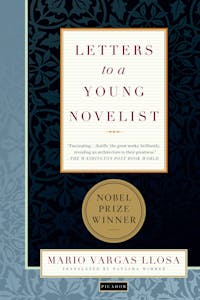Letters to a Young Novelist
 Download image
Download image
ISBN10: 0312421729
ISBN13: 9780312421724
Trade Paperback
144 Pages
$16.00
CA$22.00
In the tradition of Rilke's Letters to a Young Poet, Mario Vargas Llosa condenses a lifetime of writing, reading, and thought into an essential manual for aspiring writers, revealing in the process his deepest beliefs about our common literary endeavor. A writer, in his view, is a being seized by an insatiable appetite for creation, a rebel and a dreamer. But dreams, when set down on paper, require disciplined development, and so Vargas Llosa undertakes to supply the tools of transformation.
Drawing on the stories and novels of writers from around the globe—Borges, Bierce, Celine, Cortazar, Faulkner, Kafka, Robbe-Grillet—he lays bare the inner workings of fiction, examining time, space, style, and structure, all the while urging young novelists not to lose touch with the elemental urge to create.
Reviews
Praise for Letters to a Young Novelist
"Fascinating . . . distills [the great works] brilliantly, revealing an architecture to their greatness."—The Washington Post Book World
"[Vargas Llosa's] ambition worthy of . . . masters . . . with a technical skill that brings him closer to the heirs of Flaubert and Henry James."—Suzanne Jill Levine, The New York Times Book Review
"Under the persiflage of Letters to a Young Novelist, Vargas Llosa gives us his take on writers and writing [which] gives new insight into the creative process."—Mark Axelrod, The Review of Contemporary Fiction
"A series of brief chapters that serves as a wonderful, refreshing reprise for the practicing writer and an essential guide to both the technical and philosophical aspects of writing fiction for anyone just starting out."—Alan Cheuse, San Francisco Chronicle
"Vargas Llosa's guide is a fascinating commentary on the self-devouring monster—Flaubert's and Borges's mythical catoblepas—that true writers must become. Good novelists learn to scavenge their own meager life experience, says Vargas Llosa, then digest and transform it so that it becomes rich, luminous—unrecognizable—on the page. His book fairly quivers with handy aphorisms: 'Fiction is a lie covering up a deep truth,' he intones, then explains why all novelists are, by necessity, liars. Summoning masters from Céline to Juan Rulfo to Faulkner, he gives 10 deft lessons on devices that have helped great works attain their power, distilling each brilliantly, revealing an architecture to the greatness."—Marie Arana, The Washington Post
"If a book this clear and useful may not guide your hand in writing a novel, it will certainly help you understand what a novel is. It will make you, if not a novelist, at least a subtler taster of novels, the way, say, ballet classes provide students a chance to be, if not great dancers, finer appraisers of dance. Or, as a literate wolf could have said, it will give you bigger eyes, all the better to read with."—Orlando Aloma, The San Diego Union-Tribune
s20"Write every day; write only when you feel like it. Never read when you are writing; read all the time . . . While many writing manuals linger on such superficical issues, few offer an education in the fundamental tools of the trade. This, however, is exactly what Mario Vargas Llosa does in Letters to a Young Novelist, a book of such economy and authority that it ought to be dubbed the world's cheapest MFA . . . [This book] will instruct, illuminate, and, most importantly, inspire."—John Freeman, The Plain Dealer (Cleveland)
"Warm, generous, open-minded . . . bracing, even exciting . . . To discuss the elements of fiction he begins with style and then undertakes the subjects of the narrator and 'narrative space,' time, the different 'levels of reality' in different works, the uses of abrupt shifts and subtle transitions, the different sorts of 'Chinese-box' organization, the importance of omitting central information, and his concept of 'communicating vessels' (the ways that seemingly unrelated stories impinge upon one another)."—The News & Observer (Raleigh)
"Ought to be dubbed the world's cheapest MFA . . . Not just a book for writers, but one for readers, too . . . [It] will instruct, illuminate, and most important, inspire."—St. Petersburg Times
"In this regard, Letters to a Young Novelist is not just a book for writers, but one for readers, too. Many of the Latin American novelists Vargas Llosa refers to—Alejo Carpentier, Juan Rulfo and others—are, in spite of their great work, largely unknown here. Letters to a Young Novelist is a terrific introduction to these writers. And for those who want to do more than read, Letters to a Young Novelist will instruct, illuminate and, most important, inspire."—John Freeman, The Commercial Appeal (Memphis)
"In eleven vibrant and elegantly argued, essay-long letters, one of the great modern novelists offers advice on the craft of writing . . . When he draws on other works to reveal some tricks of the writer's trade, [Vargas Llosa] breathes new life into the classics; his consistently brilliant observations constitute critical revelations in their own right. Nothing short of a primer for aspiring novelists, this book deserves a place next to Rilke's timeless Letters to a Young Poet."—Library Journal
Reviews from Goodreads
About the author
Mario Vargas Llosa; Translated by Natasha Wimmer
RELATED
Read Articles by the Author at the Guardian
How I Lost My Fear of Flying: FSG Work in Progress essay by Vargas Llosa



